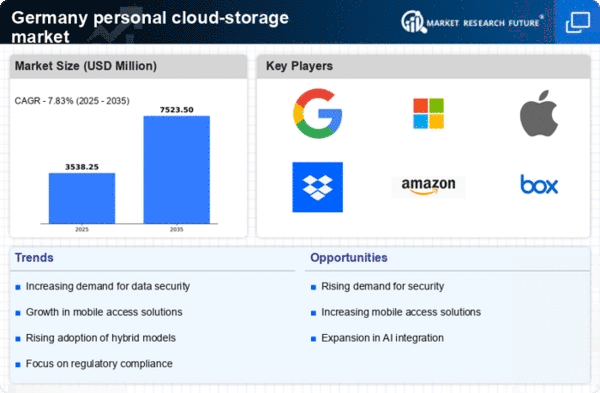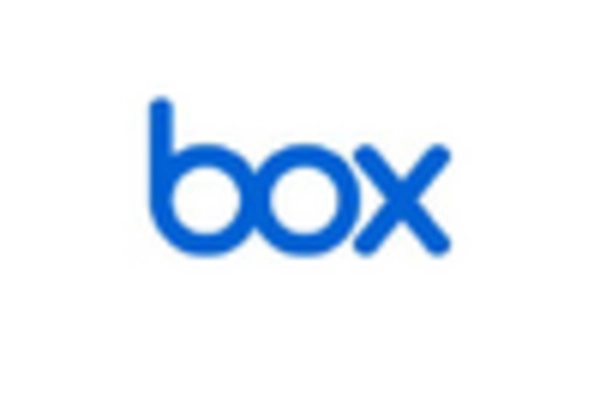Growing Mobile Device Usage
The proliferation of mobile devices in Germany is significantly influencing the personal cloud-storage market. As of November 2025, over 80% of the population owns a smartphone, leading to an increased need for accessible and reliable cloud storage solutions. Users are increasingly relying on personal cloud services to store and share files seamlessly across devices. This trend is further supported by the rise of remote work and digital collaboration, where individuals require instant access to their data from various locations. Consequently, cloud-storage providers that optimize their services for mobile compatibility are likely to see substantial growth in user adoption.
Rising Data Privacy Concerns
In the context of the personal cloud-storage market, rising data privacy concerns among consumers in Germany are driving demand for secure storage solutions. With increasing awareness of data breaches and unauthorized access, individuals are seeking platforms that prioritize data protection. According to recent surveys, approximately 70% of German users express apprehension regarding data security, prompting cloud-storage providers to enhance their security measures. This trend indicates a shift towards services that offer end-to-end encryption and robust privacy policies. As a result, companies that can effectively address these concerns are likely to gain a competitive edge in the personal cloud-storage market.
Emergence of Smart Home Technologies
The integration of smart home technologies is reshaping the personal cloud-storage market in Germany. As households increasingly adopt smart devices, the demand for centralized data storage solutions is on the rise. Smart home devices generate vast amounts of data, necessitating efficient storage and management. Reports indicate that the smart home market in Germany is projected to grow by 25% annually, creating opportunities for cloud-storage providers to offer tailored solutions. By enabling users to store and access data from their smart devices, companies can enhance user experience and drive growth in the personal cloud-storage market.
Shift Towards Eco-Friendly Solutions
The personal cloud-storage market in Germany is witnessing a shift towards eco-friendly solutions as consumers become more environmentally conscious. With increasing awareness of climate change and sustainability, individuals are seeking cloud services that prioritize energy efficiency and reduced carbon footprints. Reports indicate that around 55% of German users prefer providers that utilize renewable energy sources for their data centers. This trend suggests that companies that adopt sustainable practices may attract a larger customer base, thereby enhancing their position in the personal cloud-storage market. As sustainability becomes a key consideration, the market is likely to evolve to meet these expectations.
Increased Focus on Digital Transformation
The ongoing digital transformation across various sectors in Germany is propelling the personal cloud-storage market. Businesses and individuals alike are transitioning to digital platforms, leading to a surge in data generation. As organizations seek to streamline operations and enhance productivity, the demand for cloud storage solutions is expected to rise. Recent data suggests that approximately 60% of German companies are investing in digital infrastructure, which includes cloud services. This trend indicates a growing reliance on personal cloud-storage solutions for data management, collaboration, and accessibility, thereby fostering market growth.
















